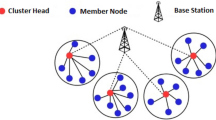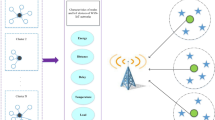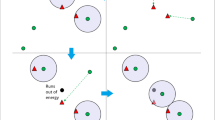Abstract
Wakeup scheduling in wireless sensor networks is known as the most effective way to conserve the limited amount of available energy for each sensor node. Such schedules are applicable to protocols of different network layers and often result in higher latency. Tolerance to latency varies greatly depending on the application so that it is low for a large class of delay sensitive applications. In this paper, we present a unified approach in the design of wakeup schedules in different network layers. A new distributed wakeup schedule is introduced in the context of topology control which aims to conserve more energy while not compromising on the delay performance of the system. The proposed protocol addresses the problem of increasing the network longevity for a given upper bound on the average end-to-end delay. In this scheme neither localization nor synchronization is required and only local information about the network topology is used. In addition to its simplicity of implementation, its energy overhead is negligible and it implicitly determines the routing paths. Our simulation results show that the performance of this protocol is close to the optimal schedule and significantly higher than SPAN, an existing topology control mechanism.












Similar content being viewed by others
Notes
For the complete list of symbols used in this paper refer to Table 1.
References
Texas Instruments (2007) Chipcon/TI, CC1100 Datasheet. www.chipcon.com
Ahdi F, Srinivasan V, Chua K-C (2007) TC-DSA: topology control for delay sensitive applications in wireless sensor networks. In: International conference on heterogeneous networking for quality, reliability, security and robustness (ICST QShine), Vancouver, 14–17 August 2007
Balakrishnan H, Morris R, Chen B, Jamieson K (2001) An energy-efficient coordination algorithm for topology maintenance in ad hoc wireless networks. In: Proc. of the 7th Annual ACM/IEEE In ternational Conference on Mobile Computing and Networking (MobiCom’01). IEEE, Piscataway, pp 85–96, July
Chang J-H, Tassiulas L (2004) Maximum lifetime routing in wireless sensor networks. IEEE/ACM Trans Netw 12(4):609–619
Raghavendra CR, Lu G, Krishnamachari B (2004) An adaptive energy-efficient and low-latency mac for data gathering in sensor networks. In: Proc. 4th International Workshop on Algorithms for Wireless, Mobile, Ad Hoc and Sensor Networks (WMAN 04), Santa Fe, April 2004
Hill J, Polastre J, Culler D (2004) Versatile low power media access for wireless sensor networks. In: Proceedings of the second ACM conferences on embedded networked sensor systems (SenSys), Boulder, November 2004, pp 95–107
Keshavarzian A, Lee H, Venkatraman L (2006) Wakeup scheduling in wireless sensor networks. In: MobiHoc ’06: proceedings of the seventh ACM international symposium on mobile ad hoc networking and computing, Florence, May 2006, pp 322–333
Chandrakasan AP, Bhardwaj M (2002) Bounding the lifetime of sensor networks via optimal role assignments. In: Proceedings of INFOCOM, New York, August 2002, pp 1587–1596
Read R, Tarjan RE (1975) Bounds on backtrack algorithms for listing cycles, paths, and spanning trees. Networks 5:237–252
Schurgers C, Tsiatsis V, Srivastava MB (2002) STEM: topology management for energy efficient sensor networks. In: IEEE aerospace conference, vol 3(1). IEEE, Piscataway, pp 1099–1108, March
Xu Y, Heidemann JS, Estrin D (2001) Geography-informed energy conservation for ad hoc routing. In: Mobile computing and networking, Rome, 16–21 July 2001, pp 70–84
Author information
Authors and Affiliations
Corresponding author
Rights and permissions
About this article
Cite this article
Ahdi, F., Srinivasan, V. & Chua, KC. Topology Control for Delay Sensitive Applications in Wireless Sensor Networks. Mobile Netw Appl 12, 406–421 (2007). https://doi.org/10.1007/s11036-008-0049-1
Received:
Accepted:
Published:
Issue Date:
DOI: https://doi.org/10.1007/s11036-008-0049-1




